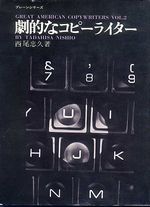 from "Great American Copywriter Vol.2"
from "Great American Copywriter Vol.2"
Tadahisa Nishio
published in March 10, 1971
chuukyuu How have you tried to keep this atomosphere?
Mrs. Robinson We have always been very, very conscious ourselves of the atomosphere and have always tried very hard to preserve it. I think maybe that very watchfulness is a part of the reason we've been able to maintain it. Among ourselves, we felt: here is something very precious and we midt keep it and we mustn't ever get amug or self-satisfied or so fat and happy that we lose what we've built. Also, there were so many people on the outside who said "Aha, this is all very well for a small agency with a few accounts, but wait until you get five million dollars billing -- wait till you get ten, twenty, fifty million dollars". Partly because of all these eyes on us, we were partticulaly watchful and felt we had to work to preserve this.
And of course, Me. Bernbach's own efforts have kept it going. He is a fascinating combination of anevangelist, who arouses excitement in people, a coach who gives evrybody a pep talk and a very very tough critic and teacher. He has never allowed anybody to get smug and of coue since the agency success is very much a personal triumph for him, he has a great stake in preserving it. I think he works very hard to sustain it.
chuukyuu I think the bigger DDB has become, the more copywriters you employed?
Mrs. Robinson When I resigned as copy chief, after 13 years, to have a child and work only part time as a copywriter, we had about thirty-five copywriters, and now I've lost count.
chuukyuu On what basis did you check applicants' ability and employ them?
Mrs. Robinson In the eary days, it was sometimes very difficult to judge ability, because there were so few opportunities for a highly imaginative writer to demonstrate what he had. It's different now. Because now there are many agencies in which creativeness is sought after and encouraged. A writer can go out with very exciting ads and get himself a job.
In those days, I had to sort of read between the lines, which means you read not only what is written but get a sense of what talent and skill produced it. I looked for vivid imagery, a good sound writing ability, a simple, colorful, strong writing style, some sense of selling, being able to get excited about a piece of stuff. something that is for sale. A sort of animal excitement that was generated somehow. And, if possible, even in a writer, a strong visual sense. Now sometime this was shown in actual ad ideas that the writer had excecuted, even just for his own satisfaction. And sometimes it would be shown in his language, in the imagimativeness, in the imagery,it woud show up. (to be continued.)